
Mark Lilla, einer der besten Kenner der europäischen Ideengeschichte, veröffentlicht dieser Tage ein Buch, das einen fälligen Perspektivenwechsel versucht: The Stillborn God. Religion, Politics and the Modern West.
Ich habe 2003 eine Stellungnahme von Mark Lilla vor dem drohenden Irak-Krieg für DIE ZEIT übersetzt, die sich heute als eine der hellsichtigsten Äusserungen von Intellektuellen aus jenen erregten Tagen erweist.
Eine Kurzfassung des Buchs ist im aktuellen New York Times Magazine zu lesen. Der Essay bietet sehr schönes Material für unsere Debatte:
Lilla schlägt vor, dass wir uns von der Vorstellung verabschieden, dass das Zeitalter der politischen Theologie vorbei sei.
Der Westen ist nicht der Normalfall mit seiner „Great Separation“ zwischen menschlichen und göttlichen Dingen – sondern die welthistorische Ausnahme, das große, gewagte – und für die meisten Menschen auf der Erde irrwitzig gewagte – Experiment. Es gibt keine historische Notwendigkeit für den Rest der Welt, uns auf diesem Weg zu folgen. Wir sind die unwahrscheinliche Ausnahme. Und wir können es uns nicht leisten zu warten, bis die anderen unserem Beispiel folgen (wozu sie ohnehin keine Lust zu haben scheinen). Wir brauchen einen modus vivendi zum Leben in einer Welt (oft in einer Gesellschaft) mit Menschen, die die Anprüche der politischen Theologie keineswegs absurd finden. Und vielleicht kann es uns helfen, diesen modus zu finden, wenn wir uns der Unwahrscheinlichkeit der westlichen Entwicklung bewusst werden, indem wir zurückgehen zu den Religionskriegen, zu Hobbes, zu Rousseau, zur „liberalen Theologie“, zum politischen Messianismus – also zu den Höhen und Tiefen unserer eigenen politischen Theologie. Das tut Lilla in seinem Essay und in seinem Buch.
Ein paar Zitate:
„So we are heirs to the Great Separation only if we wish to be, if we make a conscious effort to separate basic principles of political legitimacy from divine revelation. Yet more is required still. Since the challenge of political theology is enduring, we need to remain aware of its logic and the threat it poses. This means vigilance, but even more it means self-awareness. We must never forget that there was nothing historically inevitable about our Great Separation, that it was and remains an experiment. In Europe, the political ambiguities of one religion, Christianity, happened to set off a political crisis that might have been avoided but wasn’t, triggering the Wars of Religion; the resulting carnage made European thinkers more receptive to Hobbes’s heretical ideas about religious psychology and the political implications he drew from them; and over time those political ideas were liberalized. Even then, it was only after the Second World War that the principles of modern liberal democracy became fully rooted in continental Europe.
…
And so we find ourselves in an intellectual bind when we encounter genuine political theology today: either we assume that modernization and secularization will eventually extinguish it, or we treat it as an incomprehensible existential threat, using familiar terms like fascism to describe it as best we can. Neither response takes us a step closer to understanding the world we now live in.
It is a world in which millions of people, particularly in the Muslim orbit, believe that God has revealed a law governing the whole of human affairs. This belief shapes the politics of important Muslim nations, and it also shapes the attitudes of vast numbers of believers who find themselves living in Western countries — and non-Western democracies like Turkey and Indonesia — founded on the alien principles of the Great Separation. These are the most significant points of friction, internationally and domestically. And we cannot really address them if we do not first recognize the intellectual chasm between us: although it is possible to translate Ahmadinejad’s letter to Bush from Farsi into English, its intellectual assumptions cannot be translated into those of the Great Separation. We can try to learn his language in order to create sensible policies, but agreement on basic principles won’t be possible. And we must learn to live with that.
Similarly, we must somehow find a way to accept the fact that, given the immigration policies Western nations have pursued over the last half-century, they now are hosts to millions of Muslims who have great difficulty fitting into societies that do not recognize any political claims based on their divine revelation. Like Orthodox Jewish law, the Muslim Shariah is meant to cover the whole of life, not some arbitrarily demarcated private sphere, and its legal system has few theological resources for establishing the independence of politics from detailed divine commands. It is an unfortunate situation, but we have made our bed, Muslims and non-Muslims alike. Accommodation and mutual respect can help, as can clear rules governing areas of tension, like the status of women, parents’ rights over their children, speech offensive to religious sensibilities, speech inciting violence, standards of dress in public institutions and the like. Western countries have adopted different strategies for coping, some forbidding religious symbols like the head scarf in schools, others permitting them. But we need to recognize that coping is the order of the day, not defending high principle, and that our expectations should remain low. So long as a sizable population believes in the truth of a comprehensive political theology, its full reconciliation with modern liberal democracy cannot be expected.
…
But if we cannot expect mass conversion to the principles of the Great Separation — and we cannot — we had better learn to welcome transformations in Muslim political theology that ease coexistence. The best should not be the enemy of the good.
In the end, though, what happens on the opposite shore will not be up to us. We have little reason to expect societies in the grip of a powerful political theology to follow our unusual path, which was opened up by a unique crisis within Christian civilization. This does not mean that those societies necessarily lack the wherewithal to create a decent and workable political order; it does mean that they will have to find the theological resources within their own traditions to make it happen.“
Amen!